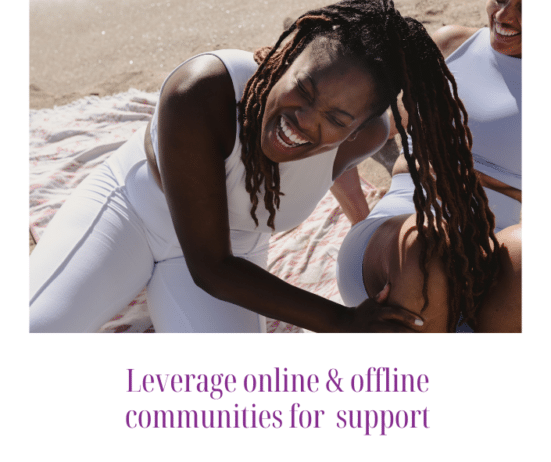July 15, 2024


Navigating isolation at work can feel like an uphill battle, especially for Black women in predominantly white spaces. Imagine this: You’re the only Black woman in a room full of colleagues. You’ve worked hard to get there, but despite your accomplishments, a subtle yet persistent feeling of being an outsider lingers. This scenario is all too familiar for many Black women navigating their careers.
As a professional career coach, I’ve witnessed firsthand the unique challenges Black women face in these environments. The microaggressions, self-doubt, and feelings of isolation are not just abstract concepts; they are daily realities that can significantly impact our mental health and work performance. It’s crucial to address these issues head-on to not only survive but thrive in your professional life.
One of my clients, Angela (all names have been changed), a senior manager at a tech firm, recounted a moment during a team meeting when a colleague made a seemingly innocuous comment about her “articulate” presentation. While it may have sounded like a compliment, it carried an undertone that questioned her place and capability in that space. This subtle yet impactful microaggression left Angela feeling isolated and undervalued, despite her evident success and competence.
Acknowledge and Address Microaggressions
Understanding Microaggressions and Their Impact
Navigating isolation for Black women often involves confronting microaggressions. Those subtle, often unintentional, discriminatory comments or behaviors that question your competence or belonging. These can range from backhanded compliments like Angela’s experience to more overt slights. Understanding microaggressions and their impact is the first step in addressing them effectively.
Microaggressions can be defined as everyday verbal, nonverbal, and environmental slights, snubs, or insults that communicate hostile, derogatory, or negative messages. These messages target individuals based on their marginalized group membership. Examples include:
- “You’re so articulate,” implying surprise that a Black woman can be well-spoken.
- “Where are you really from?” questioning one’s identity and belonging.
- Assuming a Black woman is in a subordinate role, despite her professional attire and demeanor.
Strategies for Addressing Microaggressions when Navigating Isolation
Addressing microaggressions assertively yet professionally is crucial. Here are some strategies:
- Stay Calm and Collected: It’s natural to feel hurt or angry, but maintaining composure allows for a more effective response.
- Clarify the Comment: Politely ask the person to explain what they meant. This can help reveal the underlying assumption and give you a chance to address it.
- For example, you could say, “When you said I’m articulate, did you mean to suggest that you didn’t expect me to be?”
- For example, you could say, “When you said I’m articulate, did you mean to suggest that you didn’t expect me to be?”
- Educate: Sometimes, people are unaware that their comments are offensive. Gently educating them about why their remark is problematic can foster awareness and change. This in no way means you are responsible for “gently educating” after the 2nd, 5th, 10th, 15th, etc microaggression!
- You might respond with, “I know you meant it as a compliment, but comments like that can come across as implying that it’s unusual for someone like me to be well-spoken.”
- You might respond with, “I know you meant it as a compliment, but comments like that can come across as implying that it’s unusual for someone like me to be well-spoken.”
- Document Incidents: Keeping a record of microaggressions can be crucial if patterns of behavior need to be addressed formally within your organization. Documenting the details, date, time, and context, can provide a clear record of the incidents.
Take, for example, Lesa, a marketing executive who faced constant interruptions during meetings. She began to assertively yet calmly address the interruptions, saying, “I’d like to finish my point before we move on.” By addressing the issue, she put her colleagues on notice to respect her input. By standing her ground, Lesa not only improved her professional environment but also set a precedent for other women in her company.
Navigating isolation at work involves recognizing and addressing these microaggressions. By doing so, Black women can reclaim their confidence, assert their value, and build a more inclusive workplace.


Build a Personal Board of Directors
In the quest for navigating isolation at work, building a strong support network is paramount. Imagine trying to climb a steep mountain alone. The journey is daunting, and the path is filled with obstacles. But with a group of fellow climbers, each step becomes more manageable, and the summit more attainable. That’s what your personal board of directors will do for you. In predominantly white workplaces, a robust support system can make all the difference. As Black Enterprise noted, you have to “get your cheering squad in formation”!
Finding and Joining Professional Organizations
Professional organizations for Black women offer a sanctuary where shared experiences and mutual understanding flourish. These organizations provide invaluable networking opportunities, professional development resources, and a sense of belonging. For example, joining groups like the National Association of Black Accountants or Black Women in STEM can connect you with like-minded professionals who understand the unique challenges you face.
As a career coach, I’ve seen how these connections can transform careers. One client, Cynthia, found her footing in a new city by joining a local chapter of a professional organization. Through this network, she discovered mentorship opportunities, professional growth resources, and, most importantly, a community that supported her ambitions.
Seeking Mentors Who Understand
Mentorship is another crucial element in building a support network. A mentor who understands your unique challenges can provide guidance, encouragement, and practical advice. Look for mentors who have navigated similar paths and can offer insights based on their experiences.
Consider the story of Naomi, an engineering manager who sought mentorship from a senior leader within her company. Her mentor, also a Black woman, had faced similar obstacles and provided Naomi with strategies to assert herself, navigate office politics, and manage microaggressions. This mentorship relationship not only boosted Naomi’s confidence but also accelerated her career progression. I often run into Black who say, they’ve tried. But have been unable to find a mentor. It’s perfectly fine to invest in a culturally sensitive career coach while you work on building your personal board of directors. Schedule a V.I.P. Roadmap Session with me today for culturally sensitive support.
Leveraging Social Media and Online Communities
In today’s digital age, social media and online communities are powerful tools for building support networks. Platforms like LinkedIn, Twitter, and Facebook host groups and discussions where Black women can share experiences, seek advice, and offer support.
For instance, participating in LinkedIn groups( you can join my VIP Collaborative Network for Black Women on Linkedin)focused on diversity and inclusion can connect you with professionals who are committed to fostering inclusive workplaces. These online communities can provide a sense of camaraderie and belonging, even in the absence of physical proximity.
Empowerment Through Support Networks
A strong support network empowers you to face navigating isolation head-on and emerge stronger. Reflect on what qualities you seek in a mentor. Do they need to have specific industry knowledge, or is understanding and empathy more important? A supportive network can provide a sounding board for ideas, a source of encouragement during tough times, and a collective strength that propels you forward.


Cultivate Self-Confidence and Combat Imposter Syndrome
Navigating isolation at work often involves battling self-doubt and imposter syndrome. Imagine standing on a stage, spotlight shining, while a voice in your head insists you’re not good enough. This internal struggle is all too common, but there are ways to silence that voice and step into your power.
Positive Affirmations and Self-Talk
Positive affirmations and self-talk are powerful tools for boosting self-confidence. By consciously replacing negative thoughts with positive ones, you can shift your mindset and reinforce your self-worth. For instance, starting your day with affirmations like “I am capable,” “I deserve my success,” and “My contributions are valuable” can set a positive tone. Check out my affirmations journal written specifically for Black women, Melaninated Magic: 180 Affirmations to Nurture Your Soul and Unleash Your Black Girl Joy. You can order a copy on Amazon.com.
One of my clients, Mariel, used this technique to overcome imposter syndrome. Despite her achievements, she often felt like she didn’t belong, This was especially true when she landed her new role. By practicing daily affirmations and reframing her self-talk, Mariel gradually built a stronger sense of self-confidence, which reflected in her performance and interactions at work.
Setting and Achieving Small, Measurable Goals
Setting small, measurable goals and celebrating each achievement, no matter how minor, is another effective strategy. This approach helps build momentum and reinforces your sense of accomplishment. Whether it’s completing a challenging project, receiving positive feedback, or learning a new skill, each success is a step towards greater confidence.
For example, Jayla, a marketing director, struggled with feelings of inadequacy. She started by setting achievable goals, such as mastering a new software tool and leading a successful marketing campaign. Celebrating these wins, no matter their size, helped Jayla recognize her capabilities and reduced her self-doubt.
Celebrating Successes
It’s important to acknowledge and celebrate your successes. This not only boosts your self-esteem but also reinforces your value and contributions. Think about your achievements. What are you most proud of? Reflecting on these moments can provide a confidence boost and remind you of your strengths.
Professional Development and Continuous Learning
Continuous learning and professional development are essential for navigating isolation at work and staying competitive in your field. Imagine a tree that constantly grows and adapts to its environment; similarly, ongoing learning helps you thrive in your career.
Identifying Relevant Courses and Certifications
Identifying relevant courses and certifications can enhance your skills and open new opportunities. For instance, pursuing advanced certifications in your field or enrolling in leadership development programs can equip you with the knowledge and credentials needed for career advancement.
Seeking Feedback and Using It Constructively
Seeking feedback and using it constructively is another key aspect of professional growth. Constructive feedback provides insights into areas for improvement and helps you refine your skills. Approach feedback with an open mind and a willingness to learn, viewing it as an opportunity for growth rather than criticism.
Attending Workshops, Webinars, and Conferences
Attending workshops, webinars, and conferences is a great way to stay updated in your field and network with other professionals. These events provide opportunities to learn from industry leaders, gain new perspectives, and build connections.
Effective Communication Skills
Developing strong communication skills is essential for navigating workplace dynamics and effectively advocating for yourself. Picture a bridge that connects two sides of a river. Effective communication is what bridges the gap and fosters understanding.
Assertive Communication Techniques
Assertive communication involves expressing your thoughts, needs, and concerns clearly and respectfully. It’s about finding the avoiding passive and aggressive communication. Which ensures your authentic voice is heard without feeling you need to mask your feeling all the time.
For instance, if a colleague frequently takes credit for your ideas, assertive communication might involve saying, ‘I appreciate that you liked my idea and shared it, but I would like to be recognized for my contributions as well.’ Then explain how she can recognize you and that way you remove the “oh, I didn’t know” factor from the equation. This approach demonstrates confidence and sets a precedent for fair acknowledgment of your efforts.”
Active Listening and Understanding Different Communication Styles
Active listening and understanding different communication styles are also crucial. Active listening involves fully engaging with the speaker, acknowledging their message, and responding thoughtfully. Understanding various communication styles helps you tailor your approach to different individuals and situations.
Summary
Navigating isolation at work is like navigating a dense forest. Each step can feel uncertain, but with the right tools and guidance, the path becomes clearer, and the journey more manageable. In predominantly white workplaces, it’s essential to equip yourself with strategies that foster confidence, resilience, and a sense of belonging.
Recap of Key Tips
We’ve explored several key strategies for navigating isolation and thriving in predominantly white spaces. Let’s recap these essential tips:
- Acknowledge and Address Microaggressions: Understanding and addressing microaggressions is crucial for mental well-being and professional growth. By identifying these subtle slights and addressing them assertively, you can create a more respectful and inclusive work environment.
- Build a Support Network: A strong support network, both within and outside the workplace, provides a foundation of solidarity and encouragement. Professional organizations, mentorship, and online communities offer invaluable resources and connections.
- Cultivate Self-Confidence and Combat Imposter Syndrome: Boosting self-confidence through positive affirmations, setting achievable goals, and celebrating successes helps combat imposter syndrome. Recognize your worth and take pride in your accomplishments.
- Professional Development and Continuous Learning: Ongoing learning and professional growth are vital for staying competitive and advancing in your career. Seek out relevant courses, certifications, and feedback to continually enhance your skills.
- Effective Communication Skills: Developing assertive communication techniques, practicing active listening, and honing negotiation skills are essential for navigating workplace dynamics and advocating for yourself effectively.
Each of these strategies is a tool to help you navigate the forest of workplace isolation, ensuring that you not only survive but thrive.
Now, it’s time to take action. Which of these tips will you implement first in your professional life? Get support with transforming your experiences and interactions. Your journey, much like a butterfly emerging from its chrysalis, will lead to newfound confidence and a stronger sense of self.
It’s time to take your career to the next level, sign up for a V.I.P. Roadmap Session today. Let’s work together to navigate these challenges and achieve your professional goals with confidence and clarity.
Navigating isolation at work doesn’t have to be a solitary journey. With the right strategies and support, you can carve out a path to success and fulfillment, transforming obstacles into stepping stones and challenges into opportunities for growth.


I’m an ICF Professional Certified Coach (PCC) and career coach for Twanna Carter Professional & Personal Coaching, LLC. I failed my first career transition from the military so badly, it took me the next 10+ years to build my confidence and recover. I know what it feels like to struggle with imposter syndrome and uncertainty about my worth in the workplace. It’s why I am dedicated to empowering Black women. Helping them navigate change and uncertainty by providing them with the tools and strategies they need to be successful. Schedule a free V.I.P. Roadmap Session today.
Curated Reads: Essential Books to Add to Your Personal Library
- Melaninated Magic: 180 Affirmations to Nurture Your Soul and Unleash Your Black Girl Joy by Twanna Carter, PhD
- Sacred Rest: Recover Your Life, Renew Your Energy, Restore Your Sanity by Saundra Dalton-Smith, MD
- I’m Not Yelling: A Black Woman’s Guide to Navigating the Workplace (Successful Black Business Women), Elizabeth Leiba.
- Crucial Conversations: Tools for Talking When Stakes Are High by Kerry Patterson, Joseph Grenny, Ron McMillan, and Al Switzler.
- Influence: The Psychology of Persuasion by Robert B. Cialdini.
- How to Win Friends and Influence People by Dale Carnegie.
- Lean In: Women, Work, and the Will to Lead by Sheryl Sandberg.
- Dare to Lead by Brene Brown.
- The Memo, by Minda Harts.
- Atomic Habits: An Easy & Proven Way to Build Good Habits & Break Bad Ones, by James Clear
- Worthy: How to Believe You Are Enough and Transform Your Life, by Jamie Kern Lima
- 33 Tools to Remake Your Career by Paul Gabriel Dionne
Read my latest blogs…
- How to Quiet the Inner Critic and Stop Second-Guessing Yourself in High-Stakes RoomsUnderstanding the Inner Critic Your inner critic is that persistent internal voice that judges, doubts, and second-guesses you. Ooften at… Read more: How to Quiet the Inner Critic and Stop Second-Guessing Yourself in High-Stakes Rooms
- The Survival Blueprint. What To Do Immediately When You Realize You’re Being Managed OutUnderstanding What “Being Managed Out” Really Means. And Why Immediate Help Matters The first time I realized I was being… Read more: The Survival Blueprint. What To Do Immediately When You Realize You’re Being Managed Out
- 10 Powerful Reasons Why Black Women Entrepreneurs Are Leading the Rise of EntrepreneurshipWhy Black Women Entrepreneurs Are Leading the Rise of Entrepreneurship Entrepreneurship has always symbolized courage, innovation, and self-determination. And no… Read more: 10 Powerful Reasons Why Black Women Entrepreneurs Are Leading the Rise of Entrepreneurship
- The Leadership Myth That Hurts High-Achieving Black Women. Why Slowing Down Doesn’t Make You Weak.Slowing Down Doesn’t Make You Weak Leadership isn’t just about speed, stamina, or sacrifice. It’s about authenticity, vision, and sustainable… Read more: The Leadership Myth That Hurts High-Achieving Black Women. Why Slowing Down Doesn’t Make You Weak.
- Quiet Cracking -7 Signs You’re Not ‘Fine’. You’re Burning Out in SilenceUnderstanding Quiet Cracking Quiet cracking is a modern mental-health phenomenon that describes the slow, invisible unraveling of your emotional resilience.… Read more: Quiet Cracking -7 Signs You’re Not ‘Fine’. You’re Burning Out in Silence
- Top 10 Powerful Reasons for Career Change. Why It’s Never Too Late to Start FreshUnderstanding the Need for a Career Change Changing careers is no longer rare. It’s the new normal. Today, professionals across… Read more: Top 10 Powerful Reasons for Career Change. Why It’s Never Too Late to Start Fresh
- The Hidden Cost of Being the Strong One at WorkThe Unseen Weight of Being the Strong One at Work At every office, there’s usually one person everyone leans on,… Read more: The Hidden Cost of Being the Strong One at Work
- Here’s How to Break the Cycle of Second-Guessing and DoubtUnderstanding the Cycle of Second-Guessing Leadership self-doubt among Black women doesn’t appear out of thin air. It forms slowly, shaped… Read more: Here’s How to Break the Cycle of Second-Guessing and Doubt
- How Executive Black Women Get Trapped in Survival Mode (And Why It’s Not Your Fault)Understanding High-Achieving Women Trapped in Survival Mode Survival mode is a state of constant alertness where your mind and body… Read more: How Executive Black Women Get Trapped in Survival Mode (And Why It’s Not Your Fault)
- Executive Coaching for Black Women – How to Lead with Authority, Confidence, and Emotional Well-BeingExecutive coaching for Black women is more than a leadership perk. It’s a necessary pathway to healing, empowerment, and sustainable… Read more: Executive Coaching for Black Women – How to Lead with Authority, Confidence, and Emotional Well-Being
- Workplace Isolation for Black Women Execs – 11 Powerful Strategies to Break Barriers and ThriveUnderstanding Workplace Isolation for Executive Black Women Workplace isolation for executive Black Women is a deeply layered experience. One that… Read more: Workplace Isolation for Black Women Execs – 11 Powerful Strategies to Break Barriers and Thrive
- The 5-Point LinkedIn Audit for Making a Senior-Level Pivot (2026 Edition)Why a LinkedIn Audit Is Crucial for Senior-Level Transitions In today’s competitive professional landscape, LinkedIn isn’t just a networking platform,… Read more: The 5-Point LinkedIn Audit for Making a Senior-Level Pivot (2026 Edition)






















+ show Comments
- Hide Comments
add a comment